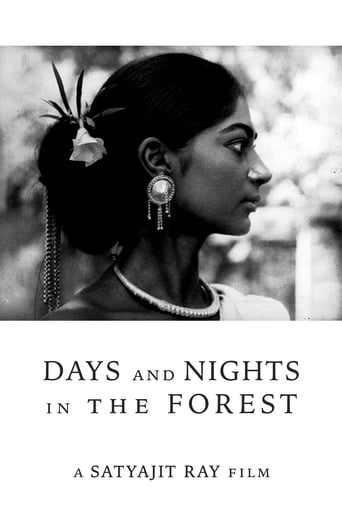Muntasim Tanvir
As a passionate movie buff, I have the highest regard for Ray's films. That has been reconfirmed after watching this subtly nuanced film from Ray. To the casual viewer, it might seem like the escapades of four middle class gentlemen when they go out of their constrictive surroundings into the wilderness and meet three women. However, a rigorous viewing will expose different layers, some surprising, and others not so surprising. With flawless and fluid direction, Ray tells a story of love lost, confidence regained, inhibitions of a conservative society blown away, overwhelming sadness, and the joy and freedom of coming close to nature. Even though it is quite an old film, it speaks of the human nature and its eternal characteristics so beautifully, that it does not seem dated at all- which is the mark of a classic. Highly recommended.
Aparna Gangopadhyay
Aranya Din-Ratri (the days & nights spent in remote forest area) Story of 4 bengali males shown beautifully by Director Mr. Satyajit Ray ! 4 friends take a break – 3 of them are average looking & tall and one is short and below average to look at. They do not make proper arrangements – just barge into a Goernment Guest House and bribe the caretaker to let them in by giving him some money. The poor care taker has an ailing wife so since he could not go out to buy stuff for them, the porter boy agrees to buy & carry food stuff for them.A typical life style of average common men (looser men rather) is shown here – how they just crib about having to butter the boss and please him by attending late night parties, boozing and spending time with cheap rich girls with artificial expressions and revealing outfits.One the friends was ditched lately by an educated girl (played by Aparna Sen) – who was fashion conscious (wore wigs to look more seducing) as well as very intelligent & observant who had the sense to smell tricky / foolish people from a distance. She had written a 5 paged letter to her boyfriend who in return could barely write half a page – showing that he was not very sound as far as 'literacy in romanticism' was concerned. This the girl understood and washed her hands off the idiot ! (very well done I would say) – the fact that her decision was absolutely right is seen later as the movie proceeds … when the same fellow indulges in intercourse with a 'dirty, smelly, ugly looking maid servant category, drunkard woman he meets in the forest remote area !!He does IT with her on open ground in the forest on the thorny weeds !! – so utterly frustrated and sex starved - just anyone would do for such men – therefore his girlfriend definitely made the right decision to ditch him.A looser man in all respect.Second fellow was a bit intellectual and adventurous , well read – in the game of "remembering names' he said Shakespeare and Sharmila Tagore – a lady he meets there, says Cleopatra – in fact each one took the name of the historical/ literary figure he / she either hero worships/identifies – or admires in one way or the other. He meets this quiet & attractive lady and gets drawn towards her – she had a traumatic childhood – the reason of her quietitude – Mother had died of fire in front of her and elder brother had committed suicide !Another looser who knows it all but cannot do anything about it.Third fellow was decent – playing it safe kinds – the widowed sister-in-law of sharmila tries to seduce him (missing her husband I guess) – had said Rabindranath Tagore in the game of 'Remembering names' by the way. A decent man who could change if he wanted to – looser or winner depended on him.Fourth fellow – happy go lucky – the fact that he was ugly & short was taken very lightly by him – had no attitude problems – couldn't have any in fact – compensating on his below average looks – so he turned comical and made things appear funny. A very common Bengali man category since the average height of Bengali men is around 5'5" and also Bengali men are dark and not very good looking – so they make fun of everything and anything and spend time making merry – with or without any reason.
Ravenus
ARANYER DIN RATRI – Satyajit Ray**MAY contain spoilers** (but it's not a mystery film so...)ADR is a beautiful chamber piece from a director who does this sort of thing very well.The opening sequence shows a motley quartet going on a holiday road trip to a forested area. They are friends, but each coming from a separate milieu and with a different temperament: Ashim (Soumitra Chatterjee, the lead in many of Ray's films), a suave and successful executive, is the unofficial leader. The neat and shy Sunjoy is a conventional pen-pusher tied to the mores of middle-class existence. Hari, a cricketer is short tempered and impulsive, while an unemployed Shekhar is the joker of the group. They halt en route at a vacant government guest house, where they intend to spend a few days. The film chronicles this interval, giving us an insight into the character of these men and the interaction they have with other people, often provoking them into reflection or change.We get an insight into their personalities in the initial period of their holiday, their sense of needing to break convention to feel some freedom from their daily routine – they bribe the caretaker to assign the guest room to them, refrain from shaving, launch drunken diatribes at the local arrack shop…the hedonistic lifestyle in short. These scenes are presented with a wholly observant attitude, never persuading the audience to either like or dislike the characters.Things take a big turn when they run into a couple of charming ladies living at a nearby bungalow. Invited by the surprisingly trustful and hospitable patriarch of the house, they meet the lovely enigmatic Aparna (Sharmila Tagore) and her cheerful but widowed sister-in-law Jaya. This part of the film is a beautiful study of the mental processes of male-female relationships in modern society: The rituals of socially acceptable cordial behavior mixed with the low-key sensuality and courtship that occurs at the outset of growing acquaintance with the opposite sex. Both Aparna and Jaya are warm-natured, confident and sophisticated women, and one well identifies with the sense of yearning mixed with hesitation that develops within the men when they interact with them. In the while Hari gets passionately involved with a young tribal woman, Duli (Simi Garewal, of all people).The last phase of the film is when their interactions have proceeded just beyond the preliminary stage. Ashim learns enough about Aparna for him to regard her as more than one of the city women he meets at so many parties, and observes aspects of her nature that lead him to feel guilt for his superficial self-oriented thinking. Sunjoy who grows increasingly comfortable in the company of Jaya gets a jarring moment; and Hari's heated pursuit of Duli ends in a rude blow. But this is not to say that the film ends on a dark note…not at all. Life for our characters goes on…and who knows what the future will bring? ADR's main strength is the completely natural way it presents its characters and situations. We've seen courtship rituals and the associated comedy thousands of times on film…a shipload of Bollywood films in the gaudily colored 60's and the 90's onward was devoted to increasingly bizarre and tasteless depictions of social romantic behavior. But you need to see a film like this to appreciate really how intricate and touchingly fragile the whole ritual can be, and how the anticipation of the man-woman relationship relates to and affects the existing behavior and thought process of the persons involved. It takes the deftness of touch of a Ray to show it to us in this light.Which brings me to the rare sour note in my experience of ADR: The 'transformation scene' of Jaya, the details of which I will not spill for the benefit of those that have not yet seen the film. I understand that Ray wanted to force some kind of a confrontation of the issue of Jaya being a widow and the social constraints upon her, but the way he has done it appears to me as very contrived and gauche, and a huge letdown given the immense easy-going charm of Kaberi Bose's performance up to that point.On a slighter note, Simi Garewal's hilariously accented Bengali makes her tribal character a hard act to digest.But on the whole ADR is a terrific movie of its type, leisurely but always focused, personal but never self-indulgent.
Paul-250
Ray excells himself in this wonderfully sensitive rites-of-passage film. A group of friends in their twenties take a short vacation in the countryside together. After some confusion about their accommodation they find themselves staying near to two respectable young women of good family who stimulate their interest. Although the women appear not too interested at first, things change, and they all begin to spend time together. Each of the characters is profoundly different from the others, and it soon becomes clear that they have different goals - and perhaps needs - in life. That does not prevent an extraordinary sexual chemistry from developing which is all the more vivid for being understated and unspoken. The picnic scene where the girls suggest they all play a literary game is replete with poignantly repressed sexuality. As the film develops the four men begin to go their separate ways, but for the two women (and for one especially) the encounter with the men has stimulated feelings it is difficult to ignore. This is a film of extraordinary subtlety and depth. A classic of world cinema by one of the cinema's greatest directors, it deserves much greater recognition.


